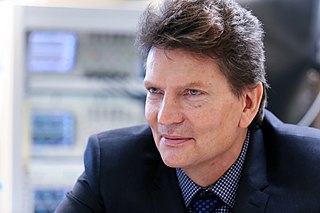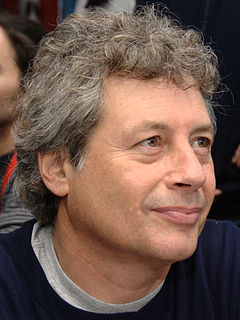A Quote by Vilayanur S. Ramachandran
What do we mean by "knowledge" or "understanding"? And how do billions of neurons achieve them? These are complete mysteries. Admittedly, cognitive neuroscientists are still very vague about the exact meaning of words like "understand," "think," and indeed the word "meaning" itself.
Related Quotes
Unlike the heart or kidney, which have a small, defined set of cell types, we still do not have a taxonomy of neurons, and neuroscientists still argue whether specific types of neurons are unique to humans. But there is no disputing that neurons are only about 10 percent of the cells in the human brain.
Vague and mysterious forms of speech, and abuse of language, have so long passed for mysteries of science; and hard or misapplied words with little or no meaning have, by prescription, such a right to be mistaken for deep learning and height of speculation, that it will not be easy to persuade either those who speak or those who hear them, that they are but the covers of ignorance and hindrance of true knowledge.
With this book in my hands, reading aloud to my friends, questioning them, explaining to them, I was made clearly to understand that I had no friends, that I was alone in the world. Because in not understanding the meaning of the words, neither I nor my friends, one thing became very clear and that was that there were ways of not understanding and that the difference between the non-understanding of one individual and the non-understanding of another created a world of terra firma even more solid than differences of understanding.
Whenever we remember a series of events, we remember them different. We are constantly changing. It's a flaw, but on the other hand, when we say a word, the meaning is not what you put into it. Rather, the meaning of the word is all of the past usages of that word. Like this cloud that makes up the meaning of the word. It's your subject if you write. For instance what you put in that word and what you assume it means, even its flaw. It has a general agreement.
I suppose there is something appealing about a word that everyone uses with absolute confidence but on whose exact meaning no two people can agree. The word that I'm thinking of right now is genre, one of those French words, like crêpe, that no one can pronounce both correctly and without sounding pretentious.
There is no use in one person attempting to tell another what the meaning of life is. It involves too intimate an awareness. A major part of the meaning of life is contained in the very discovering of it. It is an ongoing experience of growth that involves a deepening contact with reality. To speak as though it were an objective knowledge, like the date of the war of 1812, misses the point altogether. The meaning of life is indeed objective when it is reached, but the way to it is by a path of subjectivities. . . . The meaning of life cannot be told; it has to happen to a person.
I never said a word against eminent men of science. What I complain of is a vague popular philosophy which supposes itself to be scientific when it is really nothing but a sort of new religion and an uncommonly nasty one. When people talked about the fall of man, they knew they were talking about a mystery, a thing they didn't understand. Now they talk about the survival of the fittest: they think they do understand it, whereas they have not merely no notion, they have an elaborately false notion of what the words mean.
I'm very concerned with questions of language. This is what I think of when I think of myself as a writer: I'm someone who writes sentences and paragraphs. I think of the sentence - not only what it shares but, in a sense, what it looks like. I like to match words not only in a way that convey a meaning, possibly an indirect meaning, but even at times words that have a kind of visual correspondence.
Of true knowledge at any time, a good part is merely convenient, necessary indeed to the worker, but not to an understanding of his subject: One can judge a building without knowing where to buy the bricks; one can understand a violin sonata without knowing how to score for the instrument. The work may in fact be better understood without a knowledge of the details of its manufacture, of attention to these tends to distract from meaning and effect.
A definition is nothing else but an explication of the meaning of a word, by words whose meaning is already known. Hence it is evident that every word cannot be defined; for the definition must consist of words; and there could be no definition, if there were not words previously understood without definition.





































